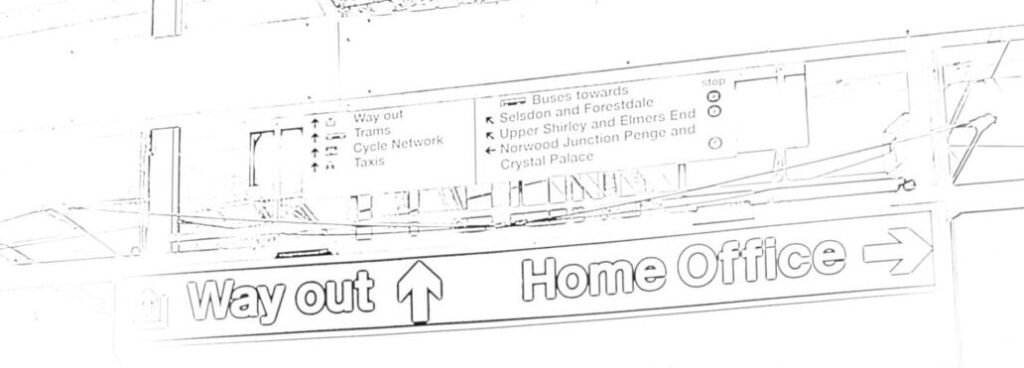
Employer Checking Service and Home Office Verification Check: Employers and HR professionals who carry out and monitor employment Right to Work Checks are likely to come across the Employer Checking Service (ECS) – Verification Checks procedure. The Right to Work Checks and Employer Checking Service (ECS) procedure were introduced by Home Office for employers to comply with the law on preventing illegal working. The relevant law is set out in sections 15 to 25 of the Immigration, Asylum and Nationality Act 2006 (the 2006 Act), section 24B of the Immigration Act 1971, and Schedule 6 of the Immigration Act 2016.
All UK employers should conduct a right to work check before employing a person, to ensure they are legally allowed to do the work in question. If an individual’s right to work is time limited, employers should conduct a follow-up check shortly before it is due to come to an end. The right to work checks are part of the sponsorship duties and compliance obligations for sponsor licence holders.
Where the worker is not your direct employee (for example, if they’re self-employed), you are not required to establish a statutory excuse BUT you must still carry out the right to work checks (and retain evidence you have done so) to comply with your sponsor duties. This is required by the Home Office Appendix D guidance for sponsors.
The correctly carried out right to work check is important, as it gives employers a statutory excuse protecting from civil penalty if an employee is later found to work illegally. Civil penalty for employing illegal workers can be up to £20,000 per each illegal worker and employers are put on a public register available for everyone to access online. What’s more, such employers may be committing criminal offence.

When to conduct Employer Checking Service Verification
Employers should know in what circumstances they should contact the Employer Checking Service to verify the right to work for employees or prospective employees. Employers will need to contact the Home Office’s Employer Checking Service (ECS) in the following scenarios:
1. You are presented with a non-digital Certificate of Application (CoA) or an acknowledgement letter or email confirming receipt of an application to EU Settlement Scheme (EUSS) on or before 30 June 2021; or
2. You are presented with a non-digital Certificate of Application (CoA) confirming receipt of an application to the EU Settlement Scheme (EUSS) on or after 1 July 2021; or
3. You have checked a digital Certificate of Application (CoA), using the online service, confirming receipt of an application to the EU Settlement Scheme (EUSS) on or after 1 July 2021, and been directed to the ECS; or
4. You are presented with a valid Application Registration Card stating that the holder is permitted to undertake the work in question. Any work will be restricted to employment in a shortage occupation; or
5. You are satisfied that you have not been provided with any acceptable documents because the person has an outstanding application with Home Office which was made before their previous permission expired or has an appeal or administrative review pending and, therefore, cannot provide evidence of their right to work; or
6. You consider that you have not been provided with any acceptable documents, but the person presents other information indicating they are a long-term resident of the UK who arrived in the UK before 1988. In the above circumstances, you will establish a statutory excuse only if you are issued with a Positive Verification Notice (PVN) confirming that the named person is allowed to carry out the type of work in question.
Certificate of Application (COA)
Employees awaiting the outcome of their EU Settlement Scheme (EUSS) application will be provided by Home Office with a Certificate of Application (CoA). They can use the CoA to prove their right to work. Those who do not yet have a digital CoA can rely on their EU Settlement Scheme email (or letter if they submitted a paper application) confirming receipt of their application, as proof of their right to work, when this is verified by the Home Office Employer Checking Service. You must make a copy of the CoA document and retain this copy, in the usual way. If you are required to verify the Certificate of Application (CoA) with the Employer Checking Service (ECS), you must also obtain and keep a copy of the Positive Verification Notice (PVN).
If you rely on a Certificate of Application (CoA) and carry out the Employer checking Service (ECS) procedure correctly, you will have a statutory excuse for six months from the date stated in the Positive Verification Notice (PVN). A PVN will not provide a statutory excuse if you know that the employment is not permitted. In such circumstances, you will also be committing a criminal offence if you continue employing such worker(s). For example, when you become aware that your employee’s immigration application was refused before the 6 months PVN expiry, you may need to stop employing the worker.
Outstanding applications, appeals and administrative reviews
If you request verification from the Employer Checking Service (ECS), because your employee or potential employee has an outstanding application with Home Office or Appeal or Administrative Review against a Home Office decision, you should wait at least 14 days after the application, appeal or administrative review has been delivered or posted to Home Office or the court, before requesting a verification check. This is because it takes this amount of time for most applications, appeals or administrative reviews to be registered with the Home Office.
In order to make the verification request with the ECS, you must obtain confirmation from your employee or potential employee of when the application, appeal or administrative review was made to the Home Office. This information must be included in the request form. The ECS aims to provide a response within five working days of receiving a valid request, although in practice it may take longer.
It is your responsibility to inform the person you intend to employ, or continue employing, that you are carrying out this check on them, to complete the verification request correctly and to make the request at least 14 days after the date of the application, appeal or administrative review was delivered or posted.